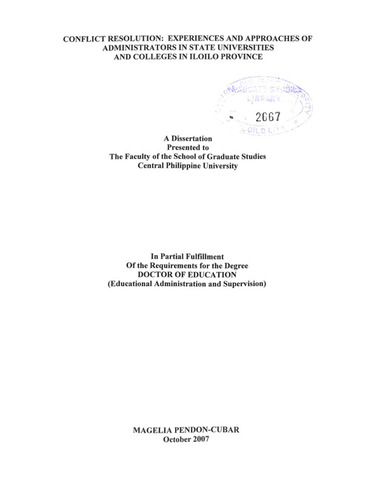Показать сокращенную информацию
Conflict resolution: Experiences and approaches of administrators in state universities and colleges in Iloilo Province
| dc.contributor.adviser | David, Fely P. | |
| dc.contributor.author | Cubar, Magelia P. | |
| dc.date.accessioned | 2021-01-27T08:15:06Z | |
| dc.date.available | 2021-01-27T08:15:06Z | |
| dc.date.issued | 2007 | |
| dc.identifier.citation | Cubar, M. P. (2007). Conflict resolution: Experiences and approaches of administrators in state universities and colleges in Iloilo Province (Unpublished doctoral dissertation). Central Philippine University, Jaro, Iloilo City. | en_US |
| dc.identifier.uri | https://hdl.handle.net/20.500.12852/122 | |
| dc.description | Abstract only | en_US |
| dc.description.abstract | The study was conducted to determine the conflict experiences of administrators of state universities and colleges in Iloilo Province and whether or not these are related to their conflict resolution approaches. It also sought to determine the profile of administrators of state universities and colleges in Iloilo Province according to sex, age, civil status, academic rank, length of service and position. The study further aimed to determine the respondents’ experiences with the different types of conflicts and whether conflict experiences vary according to sex, age, civil status, academic rank, length of service and position. The study further aimed to determine the respondents’ attitudes towards conflict and whether sex, age, civil status, academic rank, length of service and position are related to the respondents’ attitudes towards conflict. Furthermore, the study sought to determine the approaches of the respondents in solving conflicts and whether there is a significant relationship between the respondents’ personal characteristics, such as sex, age, civil status, academic rank, length of service and position and their approaches in solving conflicts; between respondents’ conflict experiences and their attitudes towards conflicts, between the respondents’ attitudes towards conflict and their approaches in solving conflicts, and between the respondents’ conflict experiences and their approaches in solving conflicts. It was hypothesized that the respondents’ conflict experiences do not significantly vary according to sex, age, civil status, academic rank, length of service and position. It was hypothesized further that the respondents’ attitudes towards conflict are not related to sex, age, civil status, academic rank, length of service, and position. It was also predicted that the respondents’ personal characteristics such as sex, age, civil status, academic rank, length of service and position are not significantly related to their approaches in solving conflicts. It was hypothesized further that the respondents’ conflict experiences were not influenced by their attitudes towards conflicts and that their attitudes towards conflicts had no bearing on their approaches in solving conflicts. It was hypothesized further that the respondents’ conflict experiences were not significantly related to their approaches in solving conflicts. This descriptive and correlational study utilized two questionnaires, namely, conflict situations experienced by administrators of state universities and colleges in Iloilo Province and their approaches in solving conflicts as well as their attitudes towards conflict. The respondents of the study were the top and middle level administrators of the state universities and colleges (SUC’s) in the Province of Iloilo namely: Northern Iloilo Polytechnic State College (NIPSC); West Visayas State University (WVSU); Iloilo State College of Fisheries (ISCOF) and Western Visayas College of Science and Technology (WVCST). These consisted of the college administrators, deans and department chairs of the four (4) state universities and colleges and their external campuses in Iloilo Province. There was a total of 100 respondents. Data were collected using the two structured questionnaires. The statistical computation of the data was processed and analyzed through the SPSS. The main statistical tools used in data analysis were the frequency distribution, the mean, the weighted mean, analysis of variance, Cramer’s V, Gamma value and Z-tests. | en_US |
| dc.format.extent | xxviii, 168 leaves | en_US |
| dc.language.iso | en | en_US |
| dc.subject.ddc | GSL Theses 378.242 C891 | |
| dc.title | Conflict resolution: Experiences and approaches of administrators in state universities and colleges in Iloilo Province | en_US |
| dc.type | Dissertation | en_US |
| dc.description.bibliographicalreferences | Includes bibliographical references | en_US |
| dc.contributor.chair | Pabulayan, Randy A. V. | |
| dc.contributor.committeemember | Catalogo, Lucy B. | |
| dc.contributor.committeemember | Sumagaysay, Celia A. | |
| dc.contributor.committeemember | Pomado, Nelson | |
| dc.contributor.department | School of Graduate Studies | en_US |
| dc.description.degree | Doctor of Education major in Educational Administration and Supervision | en_US |


